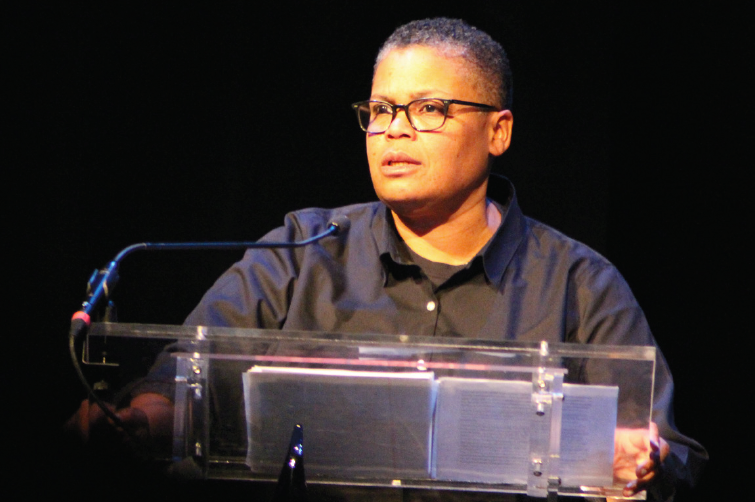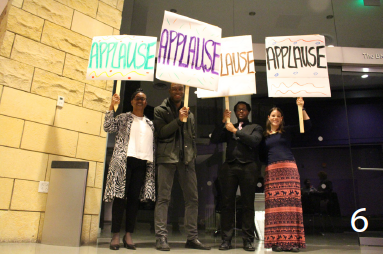
THE 2019 THOMAS MERTON AWARD EVENT WAS HELD ON NOVEMBER 22, 2019 AT THE AUGUST WILSON AFRICAN AMERICAN CULTURAL CENTER.
By Neil Cosgrove
Photos by Sheryland Neal and Steve Capri
“There is no greater evidence of the failure of the free market than housing,” Keeanga-Yamahtta Taylor reminded the hundreds who had gathered at the August Wilson Center November 22 to see her receive the 2019 Thomas Merton Award.
That statement opened Dr. Taylor’s address, which drew heavily from the research behind her recently published book Race for Profit: How Banks and the Real Estate Industry Undermined Black Homeownership. She closed with a second reminder, that “housing is a human right,” a right that cannot be granted as long as a home is exclusively regarded as a “commodity.”
The distance between profit motive and a human right available to all, including the most downtrodden and exploited, was the theme Dr. Taylor deftly illustrated throughout her talk. She described how the good intentions of the 1968 Housing and Urban Development Act were corrupted by the greed and racism of real estate agents, property appraisers, and mortgage companies, who embarked on a path of what Dr. Taylor called “predatory inclusion.”
The new law was supposed to provide home ownership to even the impoverished by requiring only a rock-bottom down payment of $200, and a federally guaranteed mortgage not to exceed 20% of a buyer’s income. What wasn’t taken into account is that the bi-partisan emphasis on “free enterprise” also gave license to brokers to direct potential buyers to clearly sub-standard properties, and to mortgage providers to use appraisers to inflate those properties’ values. After all, no matter what subsequently happened to the buyer and the home, the agent was guaranteed a commission and the lender the full value of the loan.
Such tactics resulted in HUD taking possession of 78,000 foreclosed homes by May, 1974, which in turn provided ammunition for President Reagan’s arguments that free markets would provide better housing than government programs. We’ve seen how that has turned out—huge shortages of urban affordable housing, millions committing the majority of their incomes to securing a place to live, and a “sub-prime lending” binge that led to the loss of more than 240,000 Black homes during the 2008- 09 financial crisis.
Even more corrosive was reinforcement of the racist assumption that these failures, as Dr. Taylor put it, resulted from “the poor homemaking skills of the Black owners.” To counteract this stereotype, Dr. Taylor told the story of Janice Johnson, a single Black mother rushed into a 1970 home purchase when the apartment she was living in was condemned by the city of Philadelphia. Within days of moving in, the sewer line broke. Electricity was “sporadic” and holes in the house’s foundation functioned as rats’ nests.
Prior to her address, Dr. Taylor was praised for her use of scholarship and powerful writing as one means to bring about significant social change. Merton Board Vice-President Shernell Smith said the Center “couldn’t have thought of a better award winner,” in part because “reading and scholarship are an important part of creating revolution.” Briann Moye, an environmental justice organizer with One Pennsylvania, discussed Dr. Taylor’s “heavy influence” on her activism. Earlier in the program, singer-songwriter INEZ performed a song from her newly released CD “Voicemails and Conversations,” as well as the Simon and Garfunkel classic “Bridge Over Troubled Water.” Corrinne Jasmin read four poems from her book Threads, while local activist and organizer Brittani Murray filled the role of Master of Ceremonies.
The 47th Annual Thomas Merton Award program was a departure from the traditional sit-down dinner followed by speeches that had characterized earlier events. A big part of that change was the venue itself, as the August Wilson Center provided guests with access to its galleries of curated African-American art, and to a comfortable auditorium that greatly expanded program possibilities. The five-hour-long event began with a reception fueled by the catered delicacies of Chef Claudy Pierre, founder of Eminent Hospitality Solutions, and an open cash bar. Entertainment was provided by Deejay Aesthetics, operated by multidisciplinary artist Tresa Murphy Green.
While the auditorium program, and particularly the presentation of the award followed by Dr. Taylor’s speech, were the highlights of the evening, guests were seen to be socializing and enjoying the facilities right up until the closing time of 10 p.m. November 22nd was Light-Up Night in downtown Pittsburgh, with all its holiday-related and commercially driven spectacle, but the Merton Center Award event was, to all of us at the Center, a far more meaningful and purposeful happening.
Neil Cosgrove is a member of the NewPeople editorial collective and the Merton Center board.







1. TMA HONOREE KEEANGA-YAMATTAH TAYLOR SPEAKS; 2. ENVIRONMENTAL JUSTICE ORGANIZER BRIANN MOYE, KEEANGA-YAMATTAH TAYLOR, AND TMC BOARD MEMBER M.SHERNELL SMITH PRESENT THE THOMAS MERTON AWARD; 3. TMC STAFF AND BOARD; 4. SINGER INEZ PERFORMS; 5. TMC STAFF MEMBER KRYSTLE KNIGHT WITH FOUNDER OF TRANS YOUNITING, DENA STANLEY; 6. TMA EVENT VOLUNTEERS; 7. TMA EVENT HOST, BRITTANI D. MURRAY.
NewPeople Newspaper VOL. 40 No. 10. December/January, 2019/2020. All rights reserved.

